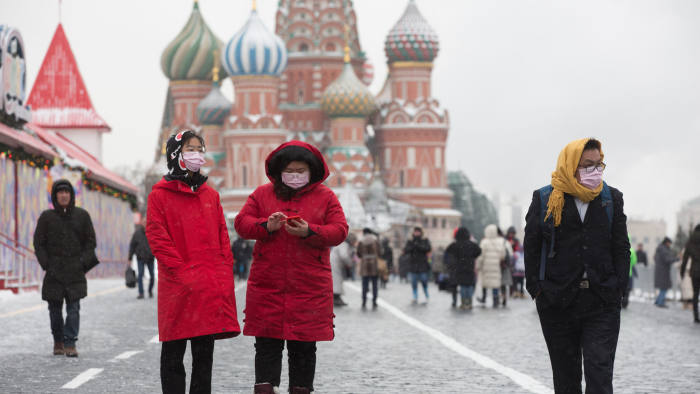Russia is Reporting Very Few Cases of COVID-19, Why?

In the last two weeks, it was observed from afar as various places around the world to which I have a personal attachment registered a grim uptick in coronavirus cases, and then, in response, effectively shut down. In Southern California, my mother was the first person I knew to self-quarantine; next were friends in Paris, who, in the span of forty-eight hours, went from eating lunch in cafés and planning a trip to Germany to hunkering down with their young children; then it was the turn of friends and colleagues in New York, where I lived for nearly a decade. During this time, Moscow, the city where I have lived for eight years, has felt like an unlikely outlier. Life here has definitely become stranger, but it is far from completely upended. As of Tuesday, Russia has four hundred and ninety-five official cases of covid-19, a small fraction of the number of cases in major European countries or in the United States.
Vladimir Putin has offered general assurances that the situation in Russia is “under control,” and, although Moscow’s mayor, a Putin loyalist, has closed schools and cancelled public events, the daily ebb and flow of the city hasn’t changed all that dramatically. I’ve mostly stayed at home, but the metro is still running, and shops and restaurants are open. The luxury department store Tsum is having one of its best years for sales in recent memory. Half my friends are observing some form of self-quarantine; the other half doesn’t get what the fuss is about—or, rather, their employers don’t
Sergey Netesov, the head of the bionanotechnology, microbiology, and virology laboratory at Novosibirsk State University, who was previously a researcher at Vector—the state laboratory that developed the first coronavirus test in Russia—told me, “These are the most dangerous carriers, and I’m worried this contingent is not being caught at all, at least not yet.”
For every story I heard that suggested a thorough, even overly paranoid, approach—one friend told me of his neighbor who was tested after other residents in their building heard her repeatedly coughing in the stairwell and called the city’s coronavirus hotline—I heard another story that conveyed a less encouraging image, such as that of a nineteen-year-old college student in Moscow who was refused a test, despite experiencing a fever and a persistent cough, even after her university dorm was closed for fear of coronavirus infection. I spoke to a man in Volgograd, a city in southern Russia, who told me that he had come down with pneumonia late last month.
At the hospital, doctors told him that rates of pneumonia in the city were ten times higher than in previous years—every second or third patient seemed to be suffering from the ailment, they said. “I couldn’t stop coughing,” the man told me. “I was running out of breath every hundred metres—it reminded me of what I’d heard everyone talking about.” Doctors asked him whether he’d been in contact with anyone who had recently been in China or Europe—as far as he knew, he hadn’t—but they didn’t test him for the coronavirus. Stories like this, Vasilyeva said, may suggest either a purposeful coverup or simply a lack of know-how, equipment, and testing abilities, especially in smaller cities and more far-flung regions.
Russia has a higher number of ventilators per capita than many Western countries, which suggests that the country may not be in the worst position as the outbreak spreads. At the same time, according to numerous reports in the Russian press, doctors around the country are worried about a lack of training in how to deal with suspected coronavirus patients, and about a deficit of basic supplies, including masks and gloves. Higher up the chain, Russia’s bureaucracy tends to favor obedience and loyalty over competence.
The first covid-19 patient in the Stavropol region turned out to be its chief infectious-diseases doctor, who’d ignored quarantine requirements after her return from Spain earlier this month. She visited several hospitals and taught numerous classes at the local medical university before coming down with symptoms and testing positive for the virus. As for the public at large, I’ve observed a kind of weary exhaustion among many Russians toward the state. The country has so many strict and redundant laws, in which the insignificant is made equal with the significant, that outsmarting or ignoring them is an understandable response. That may make it hard for the state to act with credibility and impact as it introduces measures meant to protect the population.
Lurking in the background, as infection numbers rise, is the question of the constitutional referendum scheduled for April 22nd. As I wrote earlier this month, this anodyne-sounding vote is really meant to allow Putin to run for a fifth, and possibly a sixth, term. The Kremlin wanted little fuss around the referendum, but the coronavirus is now complicating things. If infections climb exponentially, public voting will look more and more like madness, which is why the Kremlin has begun suggesting that the vote could be held in June. The Kremlin has also hinted that it may expand at-home voting, which sounds sensible, except for the fact that such a vote would be even more susceptible to fraud and manipulation than a normal Russian election. As with the facial-recognition technology deployed to find quarantine violators, such innovations, ostensibly meant to deal with the coronavirus, may well become regular features of monitoring and controlling public life in years to come.
 |
Moscow News Agency/via Reuters
I’ve spent the last days waiting for news of whether, as the case count steadily grows, Moscow will be put under general quarantine. Perhaps Putin will wait to enforce such a measure until after he gets the constitutional stamp he needs to extend his rule by another decade or more. The sudden drop in oil prices this month and the subsequent fall of the ruble will likely push Russia into recession; a widespread lockdown could produce further economic pain, which the Kremlin would consider even more politically costly than a worsening epidemic. What’s clear is that Russia’s response to covid-19 is inexorably bound up with the political needs of the moment—and, as Vlassov told me, that as the government weighs the two “the virus comes second.”
Comments